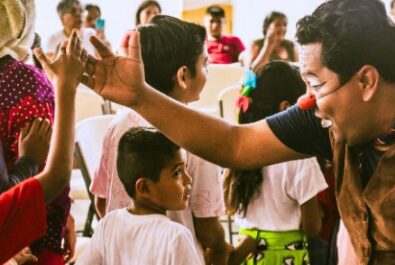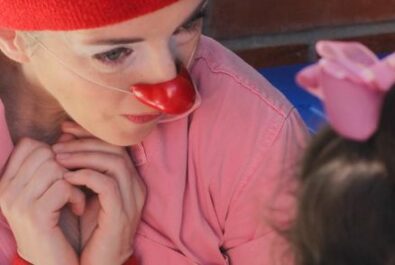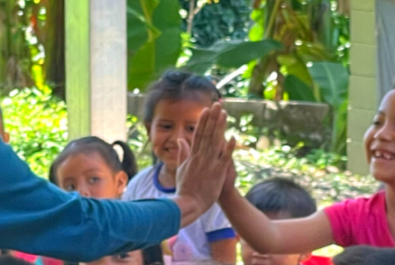Check out our April 20-28 tour in the Bay Area of the United States!
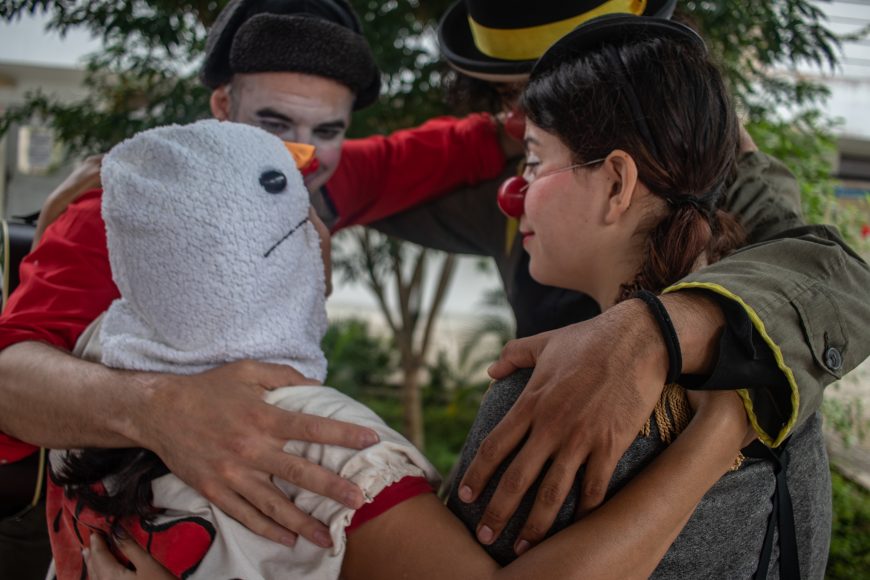
The Importance of Being Invited
What does a war zone look like? When the artists who work with Clowns Without Borders return from scenes of crisis or conflict, they’re often confronted with incredulity. How, people wonder, can CWB have a relationship with the horror and tragedy of life while still maintaining hope? Of course our answer to that is, with humor.
Recently, CWB Program Director Molly Levine spoke to a group of 150 public health students at San Jose State University, in collaboration with TeatroVision. We shared stories about our current project in El Salvador and afterward, as the students left for their following classes, one woman approached and asked, “How do you send your artists to tour in a war zone like El Salvador?”
The question gave Molly pause. “Reflecting on my own time in El Salvador last year, I don’t think of the country as a war zone,” she says. “We experienced tenderness, resilience, stoicism and generosity. The violence touches everyone, but I didn’t witness the constant chaos and uncertainty that I would associate with a ‘war zone.’” Often, the picture painted by news media is not comprehensive, focusing only on instances of violence. When CWB visits communities around the world, we’re able to see the rich and complex lives that people are living—the moments in between.
Despite that, El Salvador is considered the world’s most dangerous place outside of a war zone, and is sometimes cited as the murder capital of the world. In fact, many humanitarian aid organizations don’t go to El Salvador. So why do we go to dangerous places? Or more importantly, how do we stay safe?
The answer to both questions is the same: Because we are invited.
When we are invited to a community in crisis, we do everything we can to get there. (Think you might be our next project partner? Read here.) Being invited means that we know our presence is wanted, which is critical for team safety. In El Salvador, for instance, we work with the Ministry of Health in a neighborhood which is controlled by one of the gangs. Through their work in developing resources and a health center, the regional team from the Ministry of Health has strong relationships with the local gang leaders. Though the gangs are in conflict with each other, they are not in conflict with us. Just as they want medical resources for their children, they also want laughter.
This invitation means that we have already established trust before we arrive. We maintain trust by making sure our performances and workshops aren’t controversial. We respect local customs, and most importantly, we keep our work non-political. “When we know artists will be working in gang-controlled territory, we do our best to prepare them for what it might be like,” Molly says. “When we arrive in a neighborhood and park in front of the Health Center, we expect that some individuals from the community will come check us out. They look at our car, they ask about our work and our props. They ask where we are from. We say hello. We welcome them to the performance venue. We smile and show respect in the way that is customary for where we are. We show them that we are at ease, that we remember that we’re welcome there, that we are safe there. That they are welcome with us as well. That they are also safe with us.”
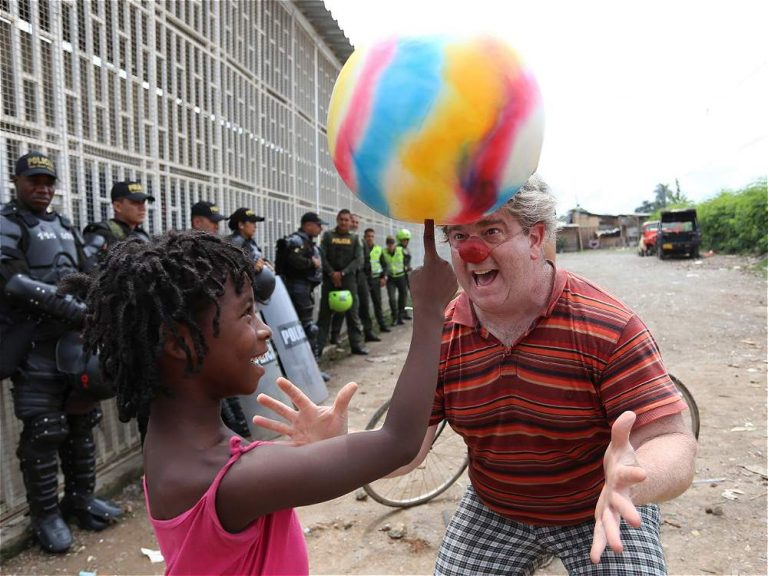
Of course, this can be a lot easier said than done. It’s hard to feel safe when you’re putting your body in a place that our news media and public opinion consider violent. Our artists are humans, and often times they’re totally out of their element. Sometimes our invitations bring us to places where the local police department doesn’t go. In these moments, as in every moment on a CWB tour, our invitation is our strongest safety net.
But our invitation to be there is just the first step in staying safe. There’s also a lot of groundwork, including respecting the conflict as it’s happening. We—with the help of our local partners—make sure to know which gang territory we’re in and make sure that our costumes are neutral (i.e. not the colors of one gang or another).
In some regions in El Salvador, it’s been common for gang members to observe our workshops and performances to make sure we uphold our promise to stay neutral. These members are known to the Ministry of Health. We follow basic safety protocols, like staying with the group and traveling with our local contacts. While the safety of our team is paramount, we’re always performing a balancing act: We have to react to the situations presented to us with clear eyes, not ones clouded by stigma or fear of “what we know about these people from the news or the police.”
It can, of course, be unsettling to perform under these conditions. Part of keeping the team safe means being aware of how our own body language impacts others. You’ve probably heard of fight or flight, the body’s natural response to a threat. When we become agitated, even with fear, someone else can perceive it as anger. So we tell our artists that if they feel unsettled, the first thing they should do is exhale. Then, do a physical inventory, and make sure to stand in a neutral position. This trick of exhaling is a common part of physical performance. A handstand, partner lift, or inversion often starts with an exhale. We use our performance training to assess the impact of our physical presence, and we embrace our vulnerability with honesty.
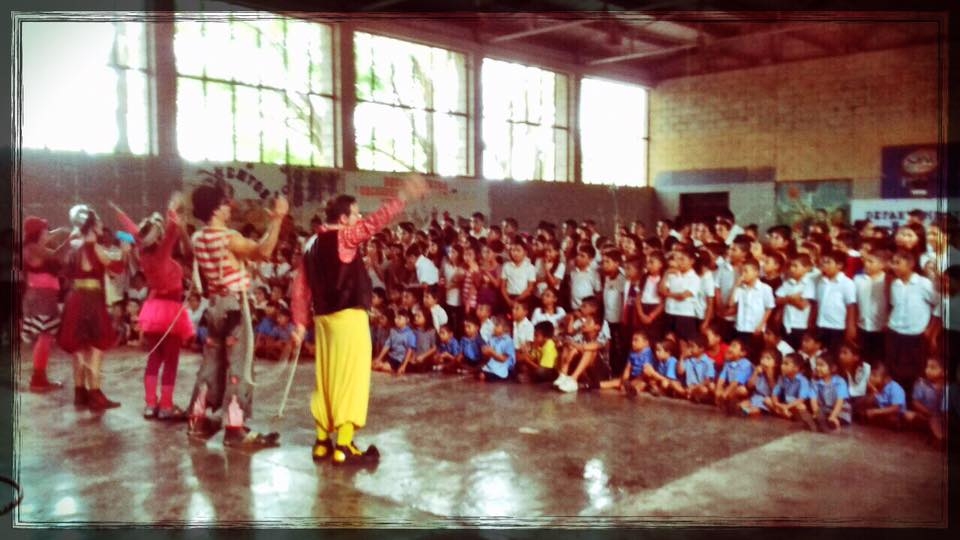
Working in gang-controlled territory also requires us to re-pattern some behaviors and expectations. In most news media, “gangs” are “evil”. Gangs are talked about en masse, but when we worked in Distrito Italia, we had to remember that gangs are actually made up of individuals: humans who have not had access to the same resources as us.
When we talk about the gangs as a performing ensemble, we need to make sure that we don’t use the term “gang member” as a blanket term to mean “people we are afraid of,” or, “dangerous people.” In order to do our job well and to truly work in allyship with our audience members, we have to remember that these “gang members” are the parents of the children we are performing for—parents who want their children to be safe and have opportunities that they did not have. They are the older teenagers who participate in our workshops, laughing and playing like the children that they are.
Many young people enter gangs in El Salvador because of the promise of safety, the promise of community, and access to resources, money and technology that seems inaccessible from any other way. The young people in El Salvador are most at risk because many family units have fractured, with one or both parents moving away to find work abroad. To us, a warzone is so much more than a simple narrative of victimization and fear. To us, a warzone includes stories of resilience and individuals looking to restore their communities.

